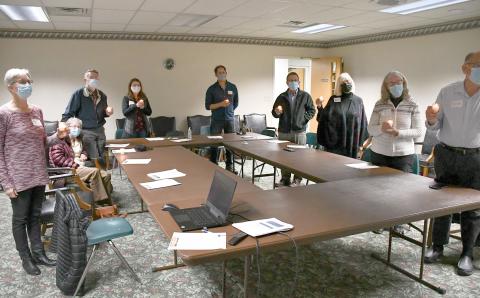Polarization is not a new problem. To explore the topic, The Banner has completed one article series and is now beginning another. In the “Past Controversies, Present Insights” series that began last fall, Will Katerberg, a professor of history and curator of Heritage Hall at Calvin University, explored some of the Christian Reformed Church’s past conflicts. (Most of those articles are online; two appeared in print, in October 2021 and January 2022.) Next we’re moving to the present with our new series, “Seeking Shalom in the Midst of Polarization.” The first of this series is Daniel Harrell’s “Our Current Polarized World” (p. 32). In effect, we looked at how we’ve dealt with polarizing issues in the past, and now we seek wisdom for dealing with our polarized world today.
Reading through Katerberg’s historical surveys, I wondered if we in the CRC have been guilty of looking at issues—at least initially—in mostly intellectual or abstract ways. It seems we have a historical tendency to approach issues mostly as intellectual problems to be solved even when they involve real, complex people who need to be loved. From baptizing adopted children to dealing with divorce, I see a pattern of lacking the humility and curiosity to listen and walk with people who were caught in the crosshairs of those issues.
I am not saying we should stop intellectual analysis. But there seems to be an overconfident belief that right doctrinal positions alone will lead to loving people rightly. Our denomination’s history shows it doesn’t work that way. Right thinking is necessary, but it’s not the only necessary factor in helping people. We also need empathy, compassion, and kindness, among other things. It is not a straight line from right answers to fixing people’s problems. Real life people and their lives are more complex than abstract puzzles.
Theologian Soong-Chan Rah used toasters and cats to illustrate the difference between simple and complex systems (Many Colors, p.191). Fixing a problem with your toaster is not the same as fixing a problem with your cat. Cats are more complex than toasters. They require more than just a correct diagnosis and a mechanical solution. You can’t simply take a cat apart to figure out what’s wrong. You might need to first ease the cat’s pain before you can even start to guess at the root of that pain. And even to do that, you first need to gain the cat’s trust. Have we been guilty of approaching every social or ethical issue as a toaster problem? Are we still making the same mistakes with today’s polarizing issues?
Ever since the European Enlightenment, Westerners have tended to over-rely on reason alone to solve all social ills. Our Western Reformed tradition was not immune from that trend. We should balance that cultural default with other approaches.
Some of us might think that the CRC’s history shows a gradual compromise with cultural trends. Perhaps. But for some issues, I wonder if our evolution stemmed more from a greater understanding of the real-life complexities that comes from actually knowing affected people. Some of these changes might simply have been different pastoral approaches to issues, not different intellectual positions. Maybe we started approaching some issues as cats instead of toasters.
About the Author
Shiao Chong is the former editor-in-chief of The Banner. He served as editor from 2016 to 2025. He attends Fellowship Christian Reformed Church in Toronto, Ont.
Shiao Chong es el redactor jefe de The Banner. El asiste a Iglesia Comunidad Cristiana Reformada en Toronto, Ont.
시아오 총은 더 배너 (The Banner)의 편집장이다. 온타리오 주 토론토의 펠로우쉽 CRC에 출석한다.
You can follow him @shiaochong (Twitter) and @3dchristianity (Facebook).








